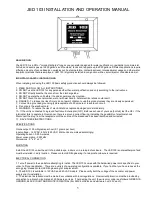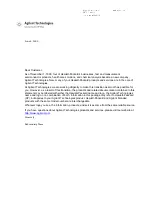
3
•
(1)
ON/OFF power switch - This switch turns the inverter ON or OFF
•
(2)
Power indicator - Green LED, when il
lumina
ted, indicates the inverter has been turned
on and is ready for use.
•
(3)
Protection indicator - Red LED, when illuminated, indicates that the inverter output is
overloaded, the supply voltage is too high or too low. The inverter will switch off until the
fault condition is corrected. An audible alarm will provide advance warning of overload or
incorrect supply voltage.
•
(4)
230Volt AC outlets - BS1363 socket, see table below for maximum output.
•
(5+, 5-)
Battery connections posts - When connecting the inverter, please observe the
correct polarity when connecting the clips to the battery. Red terminal is Positive
(5+)
and
black terminal is negative
(5-)
•
(6)
High speed cooling fan - The fans cool the internal circuits automatically, while the
inverter is in working.
•
(7)
Connecting Cable - Connection of the inverter to a 12V battery.
•
(8) USB
outlets
– Providing 5V DC supply, see table below for maximum output.
•
These inverters work in two stages.
•
During the first stage the DC to DC converter increases the DC input voltage from the
power source (e.g. a 12 volt battery) to 300 DC volts.
•
In the Second stage the high voltage DC is converted to the (AC) power you need using
advanced power MOSFET transistors or IGBT technology in a full bridge configuration.
The result is excellent overload capability and the capacity to operate difficult reactive
loads.
•
The inverter is designed to provide years of trouble-free operation and includes automatic
safety monitoring circuit to protect the inverter, your battery and any connected equipment
from inadvertent overload conditions.
•
Select a suitable location, free of dust and dirt. This is especially important if the inverter is
used in a working environment.
•
Leave a space of between 2 and 4cm to allow adequate air circulation.
•
The power supply source needs to provide at least 10.5 Volt to maximum of 15.0 Volt DC
and enough power output to operate the unit.
•
To establish the power supply required (in amps), divide the
rating of the connected
appliances (in Watts) by the supply voltage (12).
•
eg. Electric drill 230V 360W would be 360 / 12 = 30 Amps supply will be required
DESCRIPTION OF CONTROLS
OPERATING PRINCIPLES
INSTALLATION























